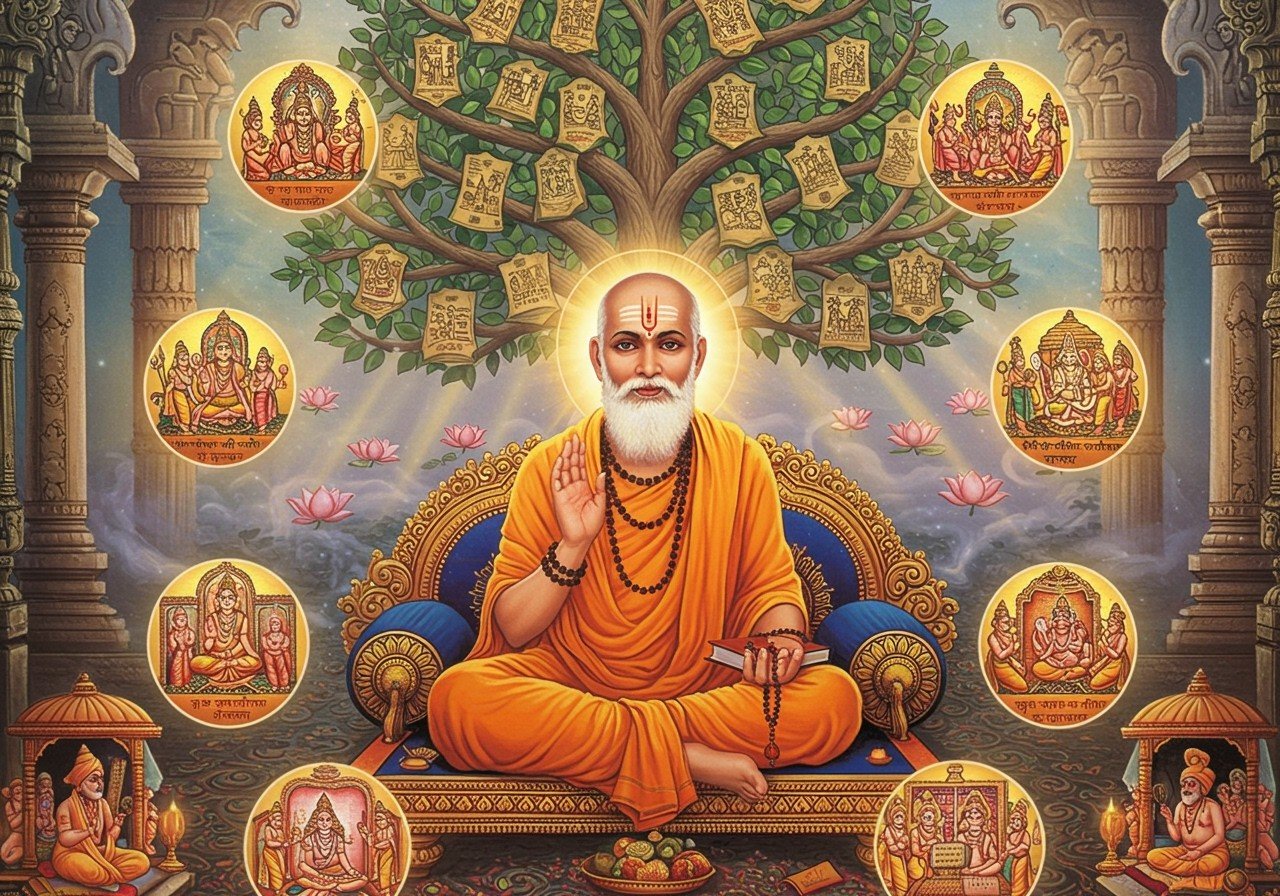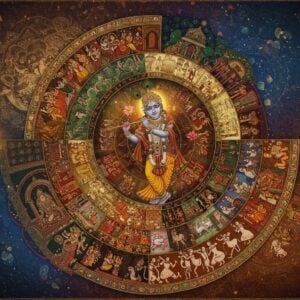
Sri Vadiraja Tirtha (c. 1480 – c. 1600), a name that resonates deeply within the annals of Dvaita Vedanta, stands as a testament to a life dedicated to spiritual wisdom and philosophical exploration. Revered as a philosopher, poet, mystic, and tireless traveler, his contributions have left an enduring mark on Hindu spiritual thought. This exploration delves into the life, miracles, and enduring legacy of this remarkable figure.
Early Life and Spiritual Journey
Born in the 16th century amidst the vibrant cultural landscape of Karnataka, India, Sri Vadiraja Tirtha embarked on his spiritual path early in life. Under the tutelage of the esteemed Vyasa Tirtha, his understanding of Dvaita Vedanta, the dualistic interpretation of Vedanta championed by Madhvacharya, flourished. His dedication and keen intellect propelled him to become a leading light of the tradition.
Ascending to the esteemed position of head of the Sodhe Matha, he took on the mantle of spreading the wisdom of Dvaita Vedanta across the Indian subcontinent. His extensive travels weren’t merely pilgrimages; they were missions of spiritual outreach. He engaged with scholars, debated with rulers, advocated for social reform, and worked tirelessly to integrate diverse communities under the banner of spiritual understanding.
Miracles and Divine Connections
Numerous accounts of miracles are interwoven with the life story of Sri Vadiraja Tirtha, each narrating an instance of his profound spiritual power. These narratives, passed down through generations, are more than just stories; they are testaments to his deep connection with the divine. One such tale recounts the extraordinary transformation of a serpent into a garland, a symbolic act often interpreted as a divine intervention, highlighting his unique connection to higher realms.
Another compelling story describes his compassionate intervention to restore life to a deceased child through the power of prayer. Such narratives have solidified his image as a conduit of divine grace, capable of transcending the boundaries of the ordinary. His special bond with Lord Hayagriva is particularly noteworthy. It is said that the deity would accept offerings directly from Sri Vadiraja Tirtha’s hands, a rare and sacred ritual signifying his deep devotion and intimate spiritual bond with the divine. This ability to communicate with deities and command the elements of nature further amplified his spiritual authority.
Literary Contributions: A Legacy in Words
Sri Vadiraja Tirtha’s influence extended beyond the realm of spiritual leadership; he was a prolific writer and poet, enriching the tapestry of Dvaita literature with his insightful works. His magnum opus, Yuktimalika, stands as a cornerstone of Dvaita Vedanta. This comprehensive text delves deep into the nuances of Madhva’s philosophy, while also offering critical perspectives on other philosophical schools like Advaita and Vishishtadvaita. This not only strengthened the intellectual foundation of Dvaita but also provided a rich resource for generations of scholars. His literary talents also found expression in the epic poem Rukminisha Vijaya, a captivating narrative centered around Krishna’s marriage to Rukmini. The poem’s rich, lyrical style continues to resonate with devotees and is often recited during religious ceremonies.
Beyond these monumental works, he penned several devotional pieces, including Lakshmi Shobhane and Sri Krishna Katha, which remain integral to religious practices even today. His impact on literature and philosophy continues to inspire scholars and devotees alike.
For those seeking to deepen their understanding of Dvaita Vedanta and connect with their spiritual heritage, Poojn.in offers a curated selection of authentic puja items. Explore our collection of Haritaki, known for its spiritual significance, and enhance your puja rituals.
Shaping Dvaita Philosophy
Sri Vadiraja Tirtha’s contributions to Dvaita philosophy are monumental. His teachings brought renewed emphasis to the distinction between the individual soul (Jiva) and the Supreme Being (Brahman), reinforcing the core tenets of Dvaita Vedanta. Through engaging in rigorous philosophical debates with scholars from other schools of thought, he honed the intellectual framework of Dvaita and established its prominence in the philosophical landscape. Under his guidance, the Sodhe Matha blossomed into a vibrant center of learning and spiritual practice, nurturing generations of Dvaita scholars and shaping the cultural and religious fabric of South India.
Enduring Legacy and Reverence
The legacy of Sri Vadiraja Tirtha continues to inspire devotion and reverence centuries later. Every year, followers congregate at the Sodhe Matha to commemorate his life and teachings through heartfelt celebrations and traditional rituals. His wisdom, preserved in ancient manuscripts and passed down through oral traditions, remains a living testament to his enduring influence.
For adherents of Dvaita Vedanta, his teachings are not mere historical artifacts; they are integrated into the fabric of their daily spiritual practice. Sri Vadiraja Tirtha’s life stands as a beacon of devotion, scholarship, and spiritual insight, illuminating the path for those seeking a deeper understanding of Hindu thought and enriching India’s rich cultural and religious heritage. Enhance your daily spiritual practice with Maha Tirtha Gold Sindoor from Poojn.in, adding a touch of sacredness to your rituals.
Connecting with the Legacy Through Poojn.in
At Poojn.in, India’s leading online store for spiritual and cultural products, we understand the significance of connecting with our rich heritage. We offer a curated collection of authentic puja items to support your spiritual journey. Whether you’re seeking pure cotton wicks for your lamps, high-quality sindoor for your rituals, or fragrant incense to create a sacred atmosphere, Poojn.in is your trusted source. Explore our collection today and bring the blessings of tradition into your home.
FAQs on Sri Vadiraja Tirtha
Who was Sri Vadiraja Tirtha? Sri Vadiraja Tirtha was a prominent Dvaita Vedanta saint, philosopher, and prolific writer who lived from approximately 1480 to 1600. He is known for his deep spiritual insights, literary contributions, and the numerous miracles attributed to him. His teachings and works have had a lasting impact on Hindu philosophy and spiritual traditions.
What miracles are associated with him? Many miracles are associated with Sri Vadiraja Tirtha, including transforming a serpent into a garland and restoring a dead child to life. These stories highlight his deep connection with the divine and his extraordinary spiritual powers. One particularly famous miracle recounts how he transformed hay into gold to assist a devotee in need.
What are his major literary works? Among his significant literary contributions are Yuktimalika, a comprehensive text on Dvaita Vedanta, and the epic poem Rukminisha Vijaya, which narrates the story of Krishna’s marriage to Rukmini. His other works include devotional pieces like Lakshmi Shobhane and Sri Krishna Katha, all of which are still revered and used in religious practices today.
How did he influence Dvaita philosophy? Sri Vadiraja Tirtha played a crucial role in shaping Dvaita philosophy by emphasizing the distinction between the individual soul and the Supreme Being. He solidified Dvaita’s position through his writings, debates with scholars from other schools of thought, and leadership of the Sodhe Matha, which became a center of Dvaita learning. His teachings provided clarity and further developed the philosophical framework established by Madhvacharya.
Why is he revered in Hindu tradition? Sri Vadiraja Tirtha is deeply revered for his profound spiritual teachings, literary accomplishments, social reforms, and the numerous miracles attributed to him. His leadership of the Sodhe Matha, his ability to connect with people from diverse backgrounds, and his unwavering devotion to Dvaita Vedanta continue to inspire reverence and devotion within the Hindu tradition.
What is his legacy today? His legacy endures through his teachings, literary works, the continued practice of Dvaita philosophy, and the institutions he established. His influence is evident in the numerous followers who continue to study his works and seek inspiration from his life. The annual celebrations at the Sodhe Matha serve as a living testament to his enduring impact on spiritual and philosophical traditions.
Are there any specific temples or institutions connected to him? Yes, several temples and institutions, particularly in Karnataka, are dedicated to Sri Vadiraja Tirtha. These serve as centers for the study and propagation of his teachings, as well as places of worship for his devotees. The Sodhe Matha, which he led, remains a significant institution within the Dvaita tradition.
What makes his teachings unique? Sri Vadiraja Tirtha’s teachings are unique for their accessibility and practical application. He had the ability to convey complex philosophical concepts in a clear and engaging manner, making them understandable to both scholars and laypeople. This, combined with his emphasis on devotion and spiritual practice, made his teachings deeply resonant and impactful. He believed in integrating philosophical understanding with daily life, thus bridging the gap between intellectual study and practical spirituality.
Explore the rich tradition of Dvaita Vedanta with authentic puja items from Poojn.in. Discover a wide range of products, from divine murtis to sacred oils, all carefully curated to enhance your spiritual practices. Visit Poojn.in today.
Siddhatek Pilgrimage: Exploring the Ashtavinayak Trail
Connecting with Your Inner Self: A Hindu Philosophy Guide
Hindu Philosophy Explained: A Beginner’s Guide
Hindu Symbols Explained: Their Meanings and Importance


